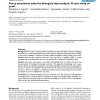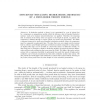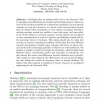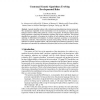91 search results - page 10 / 19 » Representing the Adverb Very in Fuzzy Set Theory |
BMCBI
2008
13 years 7 months ago
2008
Background: Last years' mapping of diverse genomes has generated huge amounts of biological data which are currently dispersed through many databases. Integration of the info...
CORR
2008
Springer
13 years 6 months ago
2008
Springer
In deduction modulo, a theory is not represented by a set of axioms but by a congruence on propositions modulo which the inference rules of standard deductive systems--such as for ...
FSKD
2007
Springer
14 years 1 months ago
2007
Springer
The selection of web services according to different quality of service (QoS) is one of the most important decision issues for which complex considerations are involved. In many c...
ER
2006
Springer
13 years 11 months ago
2006
Springer
Ontologies play an indispensable role in the Semantic Web by specifying the definitions of concepts and individual objects. However, most of the existing methods for constructing o...
ECAL
1995
Springer
13 years 11 months ago
1995
Springer
A genetic algorithm scheme with a stochastic genotype/phenotype relation is proposed. The mechanisms responsible for this intermediate level of uncertainty, are inspired by the bio...




